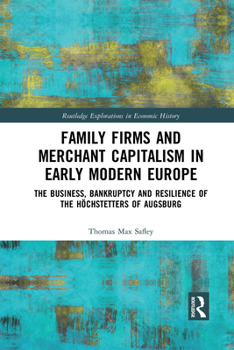Family Firms and Merchant Capitalism in Early Modern Europe: The Business, Bankruptcy and Resilience of the Höchstetters of Augsburg
Select Format
Select Condition 
Book Overview
This fascinating study follows the fortunes of the H chstetter family, merchant-manufacturers and financiers of Augsburg, Germany, in the late-fifteenth and early-sixteenth centuries, and sheds light on the economic and social history of failure and resilience in early modern Europe. Carefully tracing the chronology of the family's rise, fall and transformation, it moves from the micro- to the macro-level, making comparisons with other mercantile families of the time to draw conclusions and suggest insights into such issues as social mobility, capitalist organization, business techniques, market practices and economic institutions. The result is a microhistory that offers macro-conclusions about the lived experience of early capitalism and capitalistic practices.
This book will be valuable reading for advanced students and researchers of economic, financial and business history, legal history and early modern European history.





